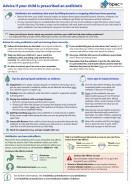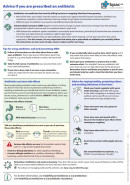Ciprofloxacin is an antibiotic. It kills meningococcal bacteria that may be in your nose or throat. Meningococcal bacteria are spread from person to person through little drops of saliva, eg, by speaking, coughing, sneezing and kissing. Ciprofloxacin is given as a single dose.
Meningococcal disease can lead to serious illnesses including meningitis (inflammation of the brain membranes) and septicaemia (blood poisoning). These illnesses can come on quickly over a few hours and can cause serious problems or even death. Read more about meningococcal disease.
Low or no data? Visit zero.govt.nz, scroll down the page then click on our logo to return to our site and browse for free.
Ciprofloxacin (for meningococcal prophylaxis)
Key points about ciprofloxacin (for meningococcal prophylaxis)
- A single dose of the antibiotic ciprofloxacin is effective in stopping the spread of meningococcal disease amongst close contacts.
- Ciprofloxacin is an antibiotic. It kills meningococcal bacteria that may be in your nose or throat.
- Find out how to take it safely and possible side effects.

You have been given ciprofloxacin because within the past 7 days you have had close contact with a person who has meningococcal disease and ciprofloxacin will help to prevent its spread. As a contact of someone with meningococcal disease, you are at increased risk of getting the disease, but overall the risk is still quite low. The highest risk is for household contacts (1 in 300), followed by pre-school contacts (1 in 1500) and is even lower in other settings.
Ciprofloxacin kills the meningococcal bacteria in your nose and throat, but it does not stop the disease if the bacteria have already spread beyond your nose and throat, so you still need to watch for any symptoms, and get medical help quickly. Read more about the symptoms of meningococcal disease.
To stop the spread of meningococcal disease, for adults and children over 12 years, ciprofloxacin is given as a single dose of 500 mg or 750 mg. Doses for children under 12 years of age are based on their weight and your doctor will let you know what this will be.
Note: Are you pregnant or breastfeeding? If so, it’s important that you tell your doctor before you start taking ciprofloxacin. Another antibiotic may be better for you.
- Swallow your tablet with a glass of water.
- You can take ciprofloxacin with or without food.
- Do not drink milk or take indigestion remedies (antacids) or medicines with iron or zinc (such as multivitamin tablets) from 2 hours before to 2 hours after you have taken the dose. This is because these other medicines interfere with ciprofloxacin and stop it from working well.
Most people do not get any side effects with a single dose of ciprofloxacin but, like any medicine, it can have mild side effects (eg, a tummy upset) for some people.
Contact your doctor straight away if you have any painful swelling and inflammation in your tendons or joints, burning, tingling, numbness or feelings of weakness in your body. If you have signs of an allergic reaction, such as itching, swelling of the face and problems breathing call tell your doctor immediately or ring Healthline 0800 611 116.
Did you know that you can report a side effect to a medicine to CARM (Centre for Adverse Reactions Monitoring)? Report a side effect to a product.(external link)
Ciprofloxacin can interfere with other medicines, herbal supplements and rongoā Māori, so check with your doctor or pharmacist before starting ciprofloxacin and before starting any new products.
Meningococcal disease(external link) National Public Health Service – Northern Region
Resources
5 questions to ask about your medications(external link) Health Quality and Safety Commission, NZ, 2019 English(external link), te reo Māori(external link)
References
- Ciprofloxacin(external link) New Zealand Formulary, March 2022
- Neisseria meningitidis invasive disease(external link) Communicable Disease Control Manual, New Zealand, 2021
Brochures

Advice if your child is prescribed an antibiotic
BPAC, NZ, 2024
Credits: Healthify He Puna Waiora Pharmacists. Healthify is brought to you by Health Navigator Charitable Trust.
Reviewed by: Maya Patel, MPharm PGDipClinPharm, Auckland
Last reviewed:
Page last updated:






